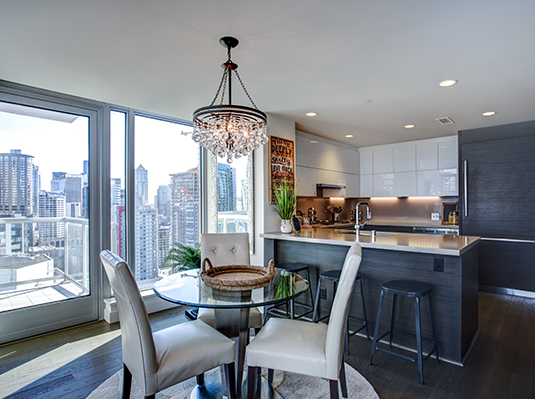
Owning a condo isn’t the same as owning a house, but you still need to protect your property. Condo insurance, also referred to as an HO-6 policy, helps you protect what is yours while your condo association carries insurance to protect the parts of the building that are considered common areas.
Why do I need condo insurance?
When you own a condo, you are responsible for the interior of your unit and any of your personal belongings inside. Condo insurance provides protection for all of those things, as well as providing personal liability coverage, loss assessment coverage, and other benefits such as living expenses coverage if you can’t live in your condo because of a covered peril.
You aren’t responsible for everything, though, and the type of condo insurance policy you should purchase will depend on what type of coverage your condo association master policy offers. A master policy covers common areas, the physical structure of the building, and often includes coverage for at least a portion of the interior of your condo, but it doesn’t cover your personal belongings or some of the other structures in your unit.
For example, some master policies don’t cover anything that was installed in the unit, which means cabinets, appliances, and other features wouldn’t be covered, while other master policies cover everything that was in the unit when you bought it, so it is important to know the details of the master policy before purchasing your own condo insurance.
Your condo association can require you to purchase condo insurance as a condition of purchasing a unit in their building. Beyond that, if you have a mortgage on your condo, your bank will require you to carry condo insurance. Condo insurance mortgage requirements will vary based on state regulations and the individual requirements of your lender.
What does a condo insurance policy cover?
Condo insurance covers many of the same things as a typical homeowners insurance policy, including:
- Dwelling coverage: Covers the structure of the condo unit itself, depending on the extent of your condo association’s master policy.
- Personal property coverage: Covers your personal property that you keep inside your condo, including things like clothing, furniture, and electronics if they are stolen or damaged by a covered peril.
- Personal liability coverage: Protects you financially if you are responsible for damage to someone else or their property. This covers property damage, medical costs, and legal costs if the situation goes to court. You may be able to purchase additional personal liability coverage through an umbrella policy if you feel like you would benefit from higher levels of liability coverage.
- Loss of use coverage: Covers your additional living expenses if your condo is damaged by a covered peril and made unlivable. Loss of use coverage would pay for a temporary rental, commuting costs, and other expenses that come with being forced to live somewhere else while your condo is being repaired.
- Loss assessment coverage: Covers your portion of an expense charged to all condo owners if the building exterior or common areas are damaged by a covered peril.
What is the difference between condo insurance and homeowners insurance?
Homeowners insurance covers many of the items in the list above, but it also includes coverage for the physical structure of the home and other structures that might be on the property like a shed or a fence. Condo insurance doesn’t cover these things because they are covered by the condo association’s master plan.
Homeowners insurance is typically more expensive than condo insurance because homeowners insurance covers the entire structure. The cost of rebuilding a house from the ground up in the event of a total loss is much higher than the cost of replacing only a portion of the physical structure in a condo, so the homeowners insurance will come with a higher premium to account for the additional costs.
What is the difference between renters insurance and condo insurance?
Renters insurance doesn’t cover any of the physical structure of your home, condo, or apartment. Much like condo insurance, renters insurance usually covers your personal property, loss of use, and personal liability coverage. Renters insurance does not cover any portion of the home or apartment, however, so if a fire destroys an apartment building the renter will be given a check from their insurance company to replace their property and their landlord’s insurance will pay to rebuild the apartment itself.
What does a condo association insurance policy cover?
A master policy is the insurance coverage your condo association has to protect the physical structure of the building and the common areas such as elevators and lobbies. There are three types of condo insurance master policies:
- Bare walls coverage: Covers the structure of the building and damage to common areas. Bare walls coverage also provides some amount of structural coverage for your unit, including things like the drywall, insulation, and plumbing, but you will need to read the specifics of the policy to know exactly what is and is not covered.
- Single entity coverage: Sometimes known as walls-in or studs-in coverage, single entity master policies include the same coverage as a bare walls policy, but coverage for your individual unit includes more of the physical structure, including walls, flooring, bathroom fixtures, and everything else that was already in place when you moved into the unit.
- All-in coverage: This is the most comprehensive type of coverage, covering the entire interior structure of your condo. This would include additions, improvements, and appliances. An all-in master policy means you probably don’t need any dwelling coverage at all on your personal condo insurance policy.
How much condo insurance coverage should I have?
The amount of condo coverage you need is based on your personal situation and the structure of your condo. An agent will typically speak to you about all of your belongings to ensure you have enough personal property coverage. They’ll then be able to help run a replacement cost estimator based on the features of your condo and will help you determine the amount of coverage needed for your structure.
You should reach out to one of our experts at Goosehead Insurance before purchasing a condo insurance policy to make sure you are getting the best coverage to meet your needs.
The contents of this article are for informational purposes only. You should not act or refrain from acting based on this information without first consulting a Goosehead licensed agent at [email protected]. We disclaim all liability for actions taken or not taken by you based on the contents of this article which is provided "as is." Goosehead makes no representation that this content is error-free.

